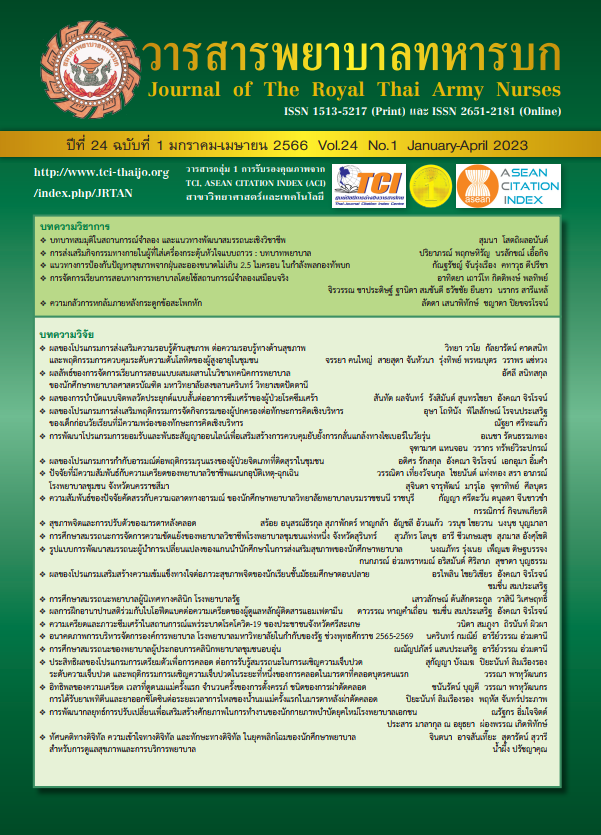The Effects of Promoting Parental Activity Organizing Behaviors on Executive Function (EF) among Preschool Children with EF Impairment
Keywords:
Executive function (EF), parental activity organizing behaviours, parent, pre-schoolerAbstract
Executive function (EFs) is learning skills that affect the abilities of pre-schoolers. This quasiexperimental study examined the effectiveness of the parent’s activity behaviour promotion program on preschool children’s EFs at the Child Development Center, Bueng Yitho Municipality, Pathum Thani Province. Purposive sampling was used to select the sample. Total of 60 preschool children with a deficit in EFs and their parents included. Descriptive statistics and Paired t-test were used for data analysis. The preschool children in the experimental group had a higher EFs, from moderate (Mean = 3.17, SD = 1.23) to good (Mean = 4.13, SD = 9.4). In addition, the experimental group of preschool children had statistically significantly higher EFs than the control group in all dimensions (p < .001). Parents play an essential role in developing EFs for their children. Therefore, the program to promote the behaviour of parents’ activities to develop an EFs for preschool children should be implemented, especially in child development centers across Thailand.
Downloads
References
Chutabhakdikul, N., Thanasetkorn, P., Lertawasdatrakul, O., & Ruksee N. Tool Development and Evaluation Criteria for Assessment of Executive Function in Early Childhood; 2017. (in Thai).
Klunklin P. Child and Adolescent Nursing: Growth and Development. Chiang Mai, Thailand: Smart Coating and Service; 2020.
Lohsomboon N, Boonyananta S. Art Leaning Process to Promote Executive Function. Journal of Education Naresuan University. 2020; 23(3): 442-51. (inThai).
McCormack, T., & Hoerl, C. Children’s futureoriented cognition. Advances in Child Development and Behavior. 2020; 58: 215-53.
Li, Q., Liu, P., Yan, N., & Feng, T. Executive Function Training Improves Emotional Competence for Preschool Children: The Roles of Inhibition Control and Working Memory. Frontiers in Psychology. 2020; 11: 347.
Thohinung, U., Boonyapuk, P., & Kodyee, S. Factors of Parental Behaviors on Promote Development of Executive Functions (EF) Early Childhood in Chiang Rai Province. Journal of The Royal Thai Army Nurses. 2021; 23(1): 344-52. (inThai).
Kao, K., Nayak, S., Doan, S. N., & Tarullo, A. R. Relations between parent EF and child EF: The role of socioeconomic status and parenting on executive functioning in early childhood. Translational Issues in Psychological Science. 2018; 4(2): 122-37.
Helm, A. F., McCormick, S. A., Deater-Deckard, K., Smith, C. L., Calkins, S. D., & Bell, M. A. Parenting and Children’s Executive Function Stability Across the Transition to School. Infant and Child Development. 2020); 29(1).
Sosic-Vasic, Z., Kröner, J., Schneider, S., Vasic, N., Spitzer, M., & Streb, J. The Association between Parenting Behavior and Executive Functioning in Children and Young Adolescents. Frontiers in Psychology. 2017; 8: 472.
Rebecca, A. M. Health Promotion of the Preschooler and Family In M. J. Hockenberry & D. Wilson (Eds.), Wong’s Nursing Care of Infants and Children. St. Louis: Missouri. 2019; 380-90.
Hanmathe, S. A guide to executive function promotes life immunity. LRG; 2015.
Pantaewan P. Ecological model and health behavior change. Journal of The Royal Thai Army Nurses 2017; 18(2):7-15. (In Thai).
Arlinghaus, K. R., & Johnston, C. A. Advocating for Behavior Change With Education. American journal of lifestyle medicine. 2017; 12(2): 113-6.
Taslima, B. (2019). Parental Knowledge, Attitudes and Practices in Early Childhood Development among Low Income Urban Parents. Universal Journal of Public Health. 2019; 7(5): 214-26. (inThai).
September, S. J., Rich, E., & Roman, N. Association Between Knowledge of Child Development and Parenting: A Systematic Review. The Open Family Studies Journal. 2017; 9: 1-14
Imnamkhao, S., & Siripul, P. Executive Function (EF) in Early Childhood: A Concept Analysis. Nursing Journal of The Ministry of Public Health. 2020; 30(3): 10-22.
McDermott MS., Oliver M., Svenson A., Simnadis T., Beck EJ., Coltman T., et al. The theory of planned behaviour and discrete food choices: a systematic review and metaanalysis. International Journal of Behavioral Nutrition and Physical Activity. 2015;12(1):162.
Zepeda, M., Varela, F., & Morales, A. Promoting Positive Parenting Practices Through Parenting Education. In N. Halfon, T. Rice, & M. Inkelas (Eds.), Building State Early Childhood Comprehensive Systems Series. National Center for Infant and Early Childhood Health Policy; 2004.
Jeong, J., Franchett, E. E., Ramos de Oliveira, C. V., Rehmani, K., & Yousafzai, A. K. Parenting interventions to promote early child development in the first three years of life: A global systematic review and meta-analysis. PLOS Medicine. 2021; 18(5).:1-51
Gibb, R., Coelho, L., Van Rootselaar, N. A., Halliwell, C., MacKinnon, M., Plomp, I., & Gonzalez, C. L. R. Promoting Executive Function Skills in Preschoolers Using a Play-Based Program. Frontiers in Psychology; 2021.
Pitipat, A., Bhokkhaphabhubeth, S., Khamsripon, C., & Reungworaboon, S. Factors Related to Behaviors Promoting Toddler’s Growth and Development of Toddler Caregivers. Journal of Health and Nursing Research. 2018; 34(3): 1-10. (inThai).
Downloads
Published
How to Cite
Issue
Section
License
Copyright (c) 2023 Journal of The Royal Thai Army Nurses

This work is licensed under a Creative Commons Attribution-NonCommercial-NoDerivatives 4.0 International License.
บทความหรือข้อคิดเห็นใดใดที่ปรากฏในวารสารพยาบาลทหารบกเป็นวรรณกรรมของผู้เขียน ซึ่งบรรณาธิการหรือสมาคมพยาบาลทหารบก ไม่จำเป็นต้องเห็นด้วย
บทความที่ได้รับการตีพิมพ์เป็นลิขสิทธิ์ของวารสารพยาบาลทหารบก
The ideas and opinions expressed in the Journal of The Royal Thai Army Nurses are those of the authors and not necessarily those
of the editor or Royal Thai Army Nurses Association.






